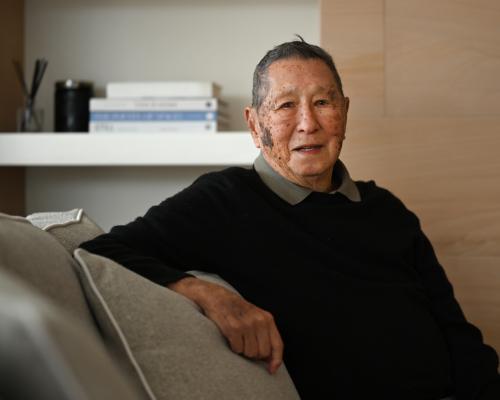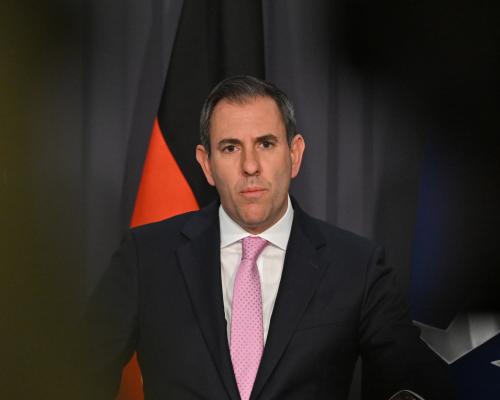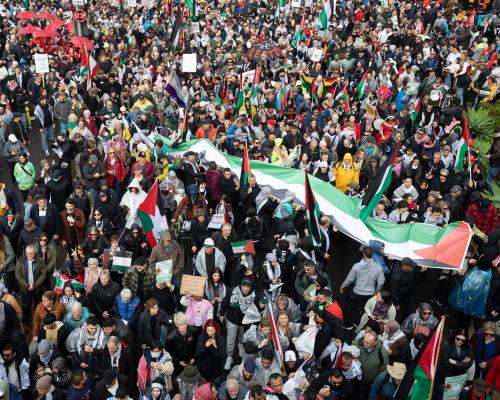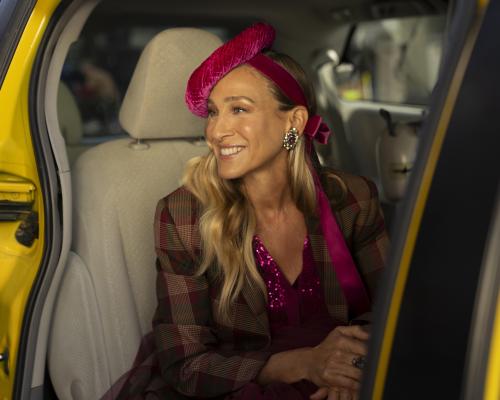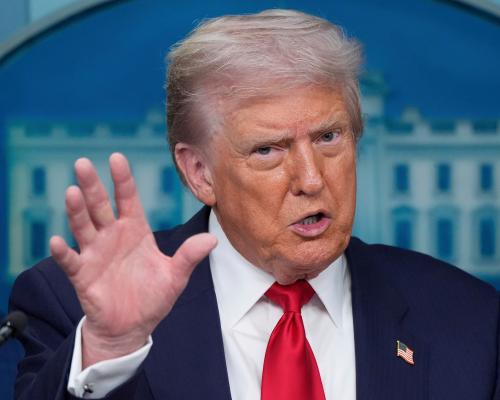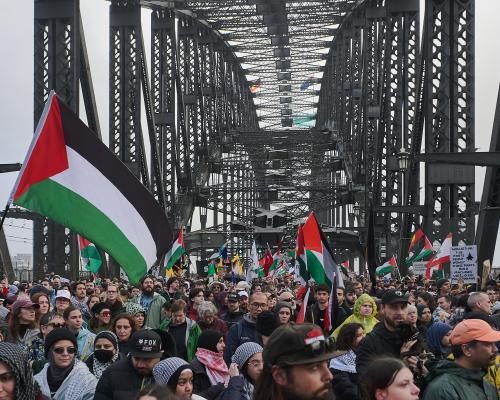
The Racial Justice Centre is preparing to file a group complaint with the Australian Human Rights Commission after a Sydney restaurant denied dine-in service to people wearing Palestinian keffiyehs during a 20-minute period last weekend.
The legal centre will file the complaint to Australia’s national anti-discrimination body on behalf of six Palestinian complainants, regarding an incident that took place on 3 August at Merivale-owned Jimmy’s Falafel in the Sydney CBD after the Sydney Harbour Bridge march, first reported by the Sydney Morning Herald.
Guardian Australia has spoken to four people, not part of the complaint, who report being told they would be barred from eating inside at Jimmy’s Falafel unless they removed their keffiyehs.
A man who wishes to be identified as Amir – not his real name – travelled from Queensland to Sydney to attend the pro-Palestine protest. Afterwards, Amir and his friend Hasan, who were both wearing Palestinian keffiyehs, went searching for food and stumbled across Jimmy’s Falafel on George Street.
Sign up: AU Breaking News email
Amir said while they were asking a restaurant employee if a table was vacant, a security guard approached the pair and said their scarves could not be worn inside the venue and had to be removed if they wanted to dine in.
The security guard said the directive came from the restaurant manager, Amir said. “We were quite shocked that this is happening to us, right in the centre of Sydney,” he said.
Amir, who said he saw other people also being turned away due to wearing keffiyehs, said the pair calmly left the venue.
Keffiyehs, traditional scarves worn across the Middle East, are often worn by people expressing support for Palestine.
A Merivale spokesperson said in a written statement that Jimmy’s Falafel was patronised by many who participated in the Harbour Bridge protest march on 3 August, including “many, many people wearing keffiyehs and hijabs”.
The statement said that a management decision was made at about 3.55pm “that people carrying large flags and placards should not carry or display them within the Jimmy’s Falafel venue”, after instances of members of the public “yelling obscenities and violent rhetoric” at Merivale venues on George Street, including comments such as “death to the IDF”, “death to all Zionist pigs” and “f***ing Zionist pigs and scum”.
“Jimmy’s staff understood that decision as providing that persons wearing political garb and/or carrying flags and placards should be kindly asked to remove those items (place them in their bags) before entering,” the spokesperson said.
“This meant that for the period 3.55pm to 4.15pm, people wearing political items of clothing were politely asked to remove those items and place them in their bags before entering.”
Merivale CCTV footage, viewed by Guardian Australia, shows that during that 20-minute window, some patrons wearing keffiyehs left the venue or were turned away, while others removed them before entering or ordering takeaway.
The footage shows other diners wearing keffiyehs inside the venue during that period, as well as at other points during the day.
On the footage, which did not include audio, just before the start of the 20-minute period, protesters appear to yell into the venue.
“To be clear, at no time was anyone refused entry or discriminated against due to their political or religious affiliations. As you can imagine, it was a day of thousands of people attending the city. It was a challenging time for venue staff, and we of course have an obligation to their safety and comfort. Merivale is politically neutral and has no interest whatsoever in disabusing any patron of their religious or political views,” the spokesperson said.
“No Merivale venues including Jimmy’s Falafel have policies on customers wearing keffiyehs or other scarves.”
Sharfah Mohamed, a lawyer at the Racial Justice Centre, said: “Our position is that Merivale’s conduct breaches the federal Racial Discrimination Act.”
In a written statement, Mohamed said that security personnel “in all types of venues are required to respond to threats to safety on a case-by-case basis based on actual conduct”.
“As to neutrality, there is nothing neutral about banning the cultural garment of a specific racial or ethnic group,” Mohamed said.
Hasan, who requested his last name be withheld, said the security guard did not say why they were not allowed to wear the keffiyehs inside the venue. “We were humiliated. I felt humiliated,” he said.
Hasan, who is Lebanese, said the keffiyeh resonates with Palestinians and is a symbol of “hope and freedom”.
“We just wanted to become one with the Palestinian people and show solidarity with them,” he said.
Amir said he now fears wearing a keffiyeh in public or expressing his opinion about the conflict in the Middle East. “I feel quite shocked, traumatised and humiliated,” he said.
Qamar Albashir said he was wearing a Moroccan scarf when his group of six people approached Jimmy’s Falafel . He said the security guard told the group, which included three people wearing keffiyehs, they could not enter the venue wearing the scarves and would have to remove them to go inside.
“We were kind of dumbfounded. When [they] said we couldn’t go in we ask why not, and the security guard said it was a private establishment. We were lost for words.”
“It felt really horrible. We felt further anguished because our kids were there with us.”
A fourth man, who requested anonymity, said he was also denied entry to Jimmy’s Falafel on the afternoon of the march while wearing a Jordanian keffiyeh.
“We were told by the security guard that we wouldn’t be allowed in because we were wearing scarves,” he said. “We were in shock at first.”
The man said he was accompanied by his wife, who was wearing a Palestinian keffiyeh, and his friend, who was not wearing a scarf. He said the group observed two other groups, where some members were wearing Palestinian keffiyehs, who were denied entry on the same basis.
The man said his friend ordered takeaway food from the venue from the street for the group.

